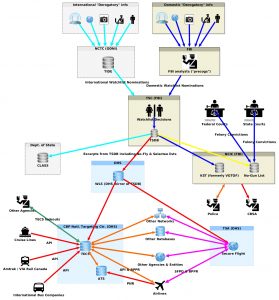It’s not a crime to flee from persecution, to try to get to a place of refuge, or to apply for asylum once you get there.
The case of a man who walked 30 miles from France to England through the tunnel under the Channel shows how wrong-headed restrictions on airlines, railroads, ferry operators, and other common carriers turn righteous refugees into common criminals in the eyes of the law.
Thousands of refugees seeking to get to the UK to apply for asylum have congregated in squatter camps and tent cities around the mouth of the Chunnel in Calais, France. Every night, hundreds of them try to get over, under, or through the barricades around the rail yard, and hide on freight trains bound for what they hope will be freedom and asylum on the other side of the Channel. Most of them are stopped at the barriers, and most of those few people who make it into the tunnel, whether on foot or hidden in or on trains, are crushed by high-speed trains, electrocuted on the live wires that power the electric trains, or suffocated in enclosed containers.
Abdul Rahman Haroun was one of the few lucky ones, perhaps the first, to make it alive, in August of last year, through the Chunnel to England — where he was arrested on arrival and charged under the UK “Malicious Damage Act” with criminal interference with trains.
When he arrived in the UK and was arrested, Mr. Haroun applied for asylum. UK authorities eventually determined that he had a well-founded fear of persecution in Sudan, from which country he had fled, and granted him asylum and the right to remain in the U.K.
But he was still prosecuted on criminal charges and spent four months behind bars for walking through the Chunnel to get to the UK.
Why didn’t Mr. Haroun take a train, plane, or ferry? Because that was prohibited by UK law — even for refugees who are legally entitled to asylum in the UK.
Even while it has been part of the European Union, the UK has never been a party to the Schengen Treaty, under which most border checkpoints and controls on movement within the Schengen Zone have been eliminated. UK immigration officers (like the US “pre-clearance” officers at airports in Canada) check the passports and visas of all Eurostar passengers in France or Belgium before they are allowed to board UK-bound trains.
As for travel by air or sea, airlines and ferry operators are subject to a fine of 2,000 pounds (about US$3,000) for each passenger they transport to the UK from any other country who is later found to be inadmissible or who lacks the documents “required” for admission, whatever that means. Carriers are fined millions of pounds a year for violating this law. These carrier sanctions create, as they are intended to do, a compelling financial incentive for carriers to err on the side of denial of transportation (for which there is, in practice, no judicial review and no sanction) in case of any doubt about admissibility to the UK.
It’s impossible to request asylum in the UK, or to obtain a definitive ruling as to whether such a request will be approved, until after one arrives in the UK. There is no document that would prove, before one arrives in the UK, that one will be granted asylum and allowed to maintain. There is no possible way to satisfy the demand of an immigration officer or airline check-in clerk for documents “proving” that one is entitled to asylum in the UK No such documents exist.
In other words, it’s illegal for a legitimate refugee qualified for asylum and right of permanent residency in the UK to board any type of common carrier that might provide transportation to the UK. Unless a refugee has their own boat to cross the Channel to the UK, or can get to the Irish Republic and then walk across the land border into Northern Ireland, the only legal way to get to the UK as a place of refuge from persecution is to swim across the English Channel or walk through the tunnel under the Channel.
It should be no surprise that some people in this situation choose to try to dodge the trains through the Chunnel as the best of a bad lot of choices. This is the choice forced on them by laws that deny them access to any mode of common carrier and leave them no legal route to asylum.
Should this be a crime, especially when they are found to be qualified for asylum and entitled to remain in the UK? Of course not.
If the UK doesn’t want people trying to walk through the Chunnel, the obvious solution is to stop denying asylum-seekers access to safe and legal transport by common carrier.
Lest we be accused of unfair criticism of the UK, we should make clear that the same is true of the US, which has a similar law (8 USC 1322) imposing a similar penalty of US$3,000 per passenger on any person or company that transports anyone whose asylum application is later denied.
As we pointed out last year to the UN Office of the High Commissioner for Human Rights:
Many eligible asylum seekers could afford to purchase airline tickets or tickets on other common carriers (ferries, trains, buses, etc.) to travel to countries where, on arrival, they would be eligible for asylum. They risk their lives… and some of them die, not for financial reasons, but because airlines or other government-licensed common carriers improperly refuse to sell them tickets or deny them boarding.
No documents are or can be required of refugees, who have often lost any papers, documents, or other possessions in the course of their flight from persecution. Carriers should be required to carry all fare-paying passengers, not sanctioned for fulfilling their duties as common carriers.
